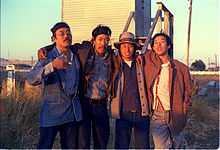Lawson Fusao Inada
Lawson Fusao Inada (born 1938 in Fresno, California) is an American poet and was the fifth poet laureate of the U.S. state of Oregon.
| Lawson Fusao Inada | |
|---|---|
 | |
| Nationality | American Sansei |
| Occupation | poet |
Early life
Inada is a third-generation Japanese American (Sansei). When he was four years old, Inada and his family were interned for the duration of World War II at camps in Fresno, Arkansas, and Colorado.[1]
Jazz influences
Following the war, Inada became a jazz musician, a bassist, following the work of Miles Davis, John Coltrane, and Billie Holiday, to whom he would later write tributes in his works.[1] Inada cites jazz and his time in the internment camps as his chief influences as a poet.[2] He studied writing at the University of California, Berkeley, the University of Oregon, and the University of Iowa.[3]
Career highlights
He began teaching poetry at Southern Oregon University in 1966.
In 1994, Inada's Legends from Camp won an American Book Award, and he has received several poetry fellowships from the National Endowment for the Arts.[3] He also won the 1997 Stafford/Hall Award for Poetry.
In 2006 Inada was named Oregon's fifth poet laureate, the first person to fill the position since William Stafford in 1989.[4][5] He was succeeded by Paulann Petersen in 2010.[6]
Quotations
- With new hope.
- We build new lives.
- Why complain when it rains?
- This is what it means to be free.
- -- Lawson Inada, Japanese American Historical Plaza, Portland, Oregon
Select works
- Three Northwest Poets: Drake, Inada, Lawder, Madison: Quixote Press, 1970.
- Before the War; Poems as They Happened, New York: Morrow, 1971.
- Aiiieeeee! An Anthology of Asian-American Writers, Washington, DC: Howard University Press, 1974 (Coeditor).
- The Buddha Bandits Down Highway 99, Mountain View: Buddhahead Press, 1978 (With Garrett Kaoru Hongo and Alan Chong Lau).
- The Big Aiiieeeee!: An Anthology of Chinese American and Japanese American Literature, New York: Penguin, 1990 (Coeditor).
- Legends From Camp, Minneapolis: Coffee House Press, 1993. Winner, American Book Award. Finalist, Los Angeles Times Book Award for Poetry.
- In This Great Land of Freedom: The Japanese Pioneers of Oregon, Los Angeles: Japanese American National Museum, 1993 (Contributor).
- Touching the Stones: Tracing One Hundred Years of Japanese American History, Portland: Oregon Nikkei Endowment, 1994 (Contributor).
- Just Intonations, Ashland, Oregon: Graven Images Gallery Press, 1996.
- Drawing the Line, Minneapolis: Coffee House Press, 1997. Winner, Oregon Book Award for Poetry. A New York Public Library Book for the Teen Age.
- Only What We Could Carry: The Japanese American Internment Experience, Berkeley: Heyday Books, 2000 (Editor and author of introduction).
- Unfinished Message: Selected Works of Toshio Mori, Berkeley: Heyday Books, 2000 (Author of introduction).
- A Matter of Conscience: Essays on the World War II Heart Mountain Draft Resistance Movement. Powell, Wyoming: Western History Publications, 2002 (Contributor).
See also
- List of Asian American writers
- Japanese American Internment
- Japanese American Historical Plaza, Portland
Notes
- ↑ 1.0 1.1 "Lawson Fusao Inada". WritersOnTheEdge.org. Archived from the original on 2007-09-28. Retrieved 2007-07-06.
- ↑ "Lason Inada". Houghton-Mifflin. Retrieved 2007-07-06.
- ↑ 3.0 3.1 "Lawson Fusao Inada Biography". enotes.com. Retrieved 2007-07-06.
- ↑ "Oregon State Poet Laureate". Library of Congress. Retrieved 2007-07-06.
- ↑ Baker, Jeff (February 18, 2006). "From internment camp to new poet laureate". The Oregonian. pp. C01.
- ↑ Baker, Jeff (April 26, 2010). "Paulann Petersen named Oregon's sixth poet laureate". The Oregonian. Retrieved April 28, 2010.
References
- Leonard, George. (1999). The Asian Pacific American Heritage: A Companion to Literature and Arts. London: Taylor & Francis. 10-ISBN 0-8153-2980-6; 10_ISBN 978-0-8153-2980-0
- Niiya, Brian. (1993). Japanese American History: An A-to-Z Reference from 1868 to the Present. New York: Facts on File; Bonn: Verlag für die Deutsche Wirtschaft AG. 10-ISBN 0-8160-2680-7; 13-ISBN 978-0-8160-2680-7 OCLC: 26853950
External links
- Oregon Poet Laureate website
- PBS: "Oregon Laureate Reflects on Japanese Internment," NewsHour. October 3, 2008.
| |||||
|